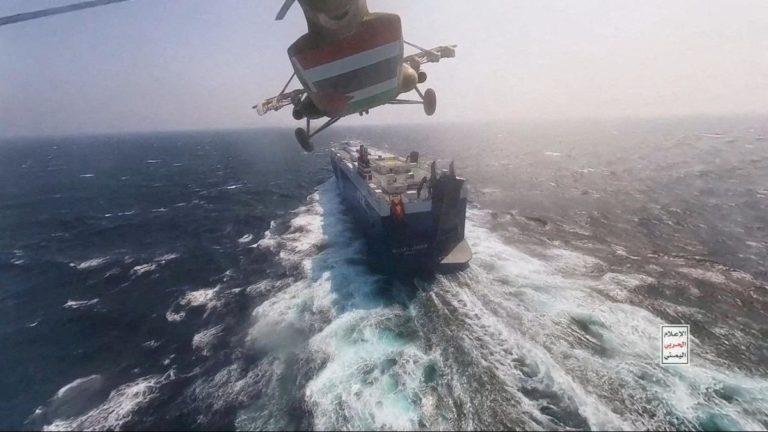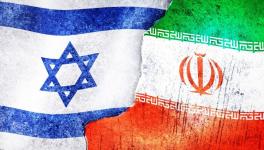US War on Terror Against Houthis is Smoke and Mirrors

A November 20, 2023 file photo of a Houthi military helicopter flying over Galaxy Leader cargo ship in the Red Sea.
Credit: Indian Punchline
The United States has hosted the first meeting of the new working group on terrorism in the Quad format in Honolulu, Hawaii, on December 19-21. The QUAD working group on terrorism was constituted in March at the foreign minister level meeting in New Delhi hosted by External Affairs Minister S. Jaishankar.
The joint statement issued after the March meeting had noted “with deep concern that terrorism has become increasingly diffuse, aided by terrorists’ adaptation to, and the use of emerging and evolving technologies such as unmanned aerial systems and the internet, including social media platforms for recruitment and incitement to commit terrorist acts, as well as for the financing, planning, and preparation of terrorist activities.”
While announcing the establishment of the Quad Working Group on Counter-Terrorism, the joint statement flagged that it “will explore cooperation amongst the Quad, and with Indo-Pacific partners, to counter new and emerging forms of terrorism, radicalisation to violence and violent extremism.”
A state department statement on Friday following the inaugural meeting of the working group underscored that the focus of the discussion was on “enhancing Quad cooperation in response to an overwhelming terrorist incident in the Indo-Pacific region.” [Emphasis added.]
The state department statement further said that the discussions pertained to “presentations and a tabletop exercise focused on exchanging information on ever-evolving terrorism threats, further developing regional coordination mechanisms, and countering terrorist use of emerging technologies. Participants (the four Quad countries) explored what capabilities and support the Quad could offer, and how the Quad might coordinate in order to support the existing capacities of Indo-Pacific countries.”
It does not need much ingenuity to figure out that the US’ focus is on the developing situation in the Red Sea where a US-led coalition of the willing is struggling to take on the challenge to maritime shipping posed by the indomitable Houthis of Yemen.
The Houthis have an old score to settle with Israel on account of the latter’s repeated covert interventions in the civil war in Yemen dating back to the 1960s on account of that country’s great importance in the eyes of Israeli strategists as Israel’s outlet to the Indian Ocean and the Far East, which is today compounded by Houthis’ support for the rights of Palestinians and refusal to normalise with Israel.
In April 2018, the UAE, taking advantage of the instability and the lack of a central government in Yemen, simply occupied that country’s Socotra island, backed by tanks, armoured vehicles and artillery. UAE has since annexed the Socotra island and in a joint project with Israel is trying to build a military base there which would be hosting Israeli soldiers, officers, and other military experts and personnel in a project to exercise military control over maritime routes and intelligence operations against Iran.
To be sure, insecure conditions affecting maritime traffic to the Suez Canal will be hugely consequential to the world economy in multiple ways — international trade and supply chains, oil market and so on. But behind the barrage of propaganda, the actual American intentions may go well beyond that. The demonisation of the Houthis provides a cloud cover to obfuscate what is in reality an incredibly complex matrix.
According to an analysis in the American think tank Washington Institute for Near East Policy, Israel has plans to deploy submarines east of Suez. Clearly, the military base in Socotra will be ideal for Israeli submarines for force projection in the Arabian Sea. Unsurprisngly, the Houthis are furious about their country’s loss of sovereignty over Socotra and the island’s transformation as an Israeli outpost with tacit American support. This is one thing.
The regional states are chary of associating with the US-led coalition of the willing to deploy naval forces in the Red Sea to preserve Israeli interests under the garb of protecting ‘freedom of navigation’. The Houthis will not compromise with Israel and the regional states tread warily so as not get caught in the crossfire. The Houthis have a well-earned reputation for being tough fighters, and in this case, they are also a highly motivated lot with adrenaline flowing in their veins having resisted the Saudi-Emirati-US war to erase them from their country’s political landscape.
From a geopolitical perspective, the US has strong reasons to dominate the Red Sea where China has a naval base in Djibouti and Washington has been fuelling the civil war in Sudan to keep the country on the boil and block Russia’s plans to set up a submarine base. Another littoral state Eritrea occupies a key strategic position on the western side of the Red Sea, which has strong economic, diplomatic and military ties with China and Russia.
Indeed, the US efforts failed miserably to overthrow the democratically elected Prime Minister Abiy Ahmed of Ethiopia, the largest country in the Horn of Africa, who is aligned to Russia. Suffice to say, the US has not a single friend or ally left today in the entire eastern part of the Red Sea.
The big question is whether the US ploy to drag QUAD — and along with that, India — into the Red Sea will succeed. This is in some ways a replay of history when resisting pressure from the George W. Bush administration, the Atal Bihari Vajpayee government refused to join the US-led coalition of the willing to invade Iraq in 2003. In retrospect, that proved to be a wise decision. Then, as now, there are influential interest groups in Delhi who would probably argue for Indian participation in the US-led ‘war on terror’ against the Houthis.
In fact, the Indian spokesman’s ambivalent remarks at a press briefing on Thursday cause some unease: “Look, India has always, of course, you know, we have vested interests and have been supportive of the free movement of commercial shipping. So that is something that we are interested in. We are, of course, monitoring the developments there. Insofar as I think there was…we are also, as you know, as part of efforts globally to…international efforts to ensure free shipping, whether it be against piracy or otherwise, India has been involved in it. So, we will continue to monitor that. I think, there was some communication regarding this task force or the operation, but I would have to get back to you regarding any specific development on that issue, because I am not aware of whether, you know, there has been any specific invitation or we have been asked to join or we have agreed to join. As I said, this is a new initiative and we will have to get back to you as soon as we have something to convey on that. But let me emphasise that we have been part of efforts to ensure the safe transit of ships in the Arabian Sea and we value the free movement of commercial shipping. I am not aware of any conversations with any specific country, certainly Iran or Yemen…”
Meanwhile, what should be carefully noted is that Israeli PM Benjamin Netanyahu telephoned Prime Minister Narendra Modi on Tuesday coinciding with the QUAD working group’s meeting in Hawaii. Modi wrote later that during a “productive” exchange of views on the “ongoing Israel-Hamas conflict” with Netanyahu, the two had “shared concerns” about maritime traffic. Modi’s post did not delve into specifics while the Israeli version claimed that Modi “noted that freedom of navigation is an essential global necessity that must be ensured”.
Stakes are indeed high for Israel to give ballast to the US-led coalition in the Red Sea. The US and Israel are desperate to rope in India in their upcoming ill-fated ‘war on terror’ against Yemen, a civilisational state, so as to give their risky enterprise a regional habitation and name.
MK Bhadrakumar is a former diplomat. He was India’s ambassador to Uzbekistan and Turkey. The views are personal.
Courtesy: Indian Punchline
Get the latest reports & analysis with people's perspective on Protests, movements & deep analytical videos, discussions of the current affairs in your Telegram app. Subscribe to NewsClick's Telegram channel & get Real-Time updates on stories, as they get published on our website.
























